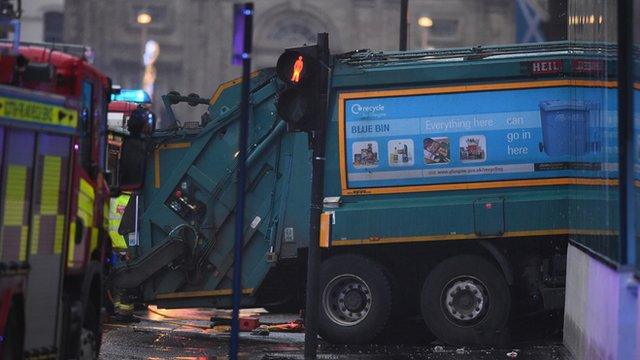Glasgow bin lorry crash inquiry: What have we learned?
- Published
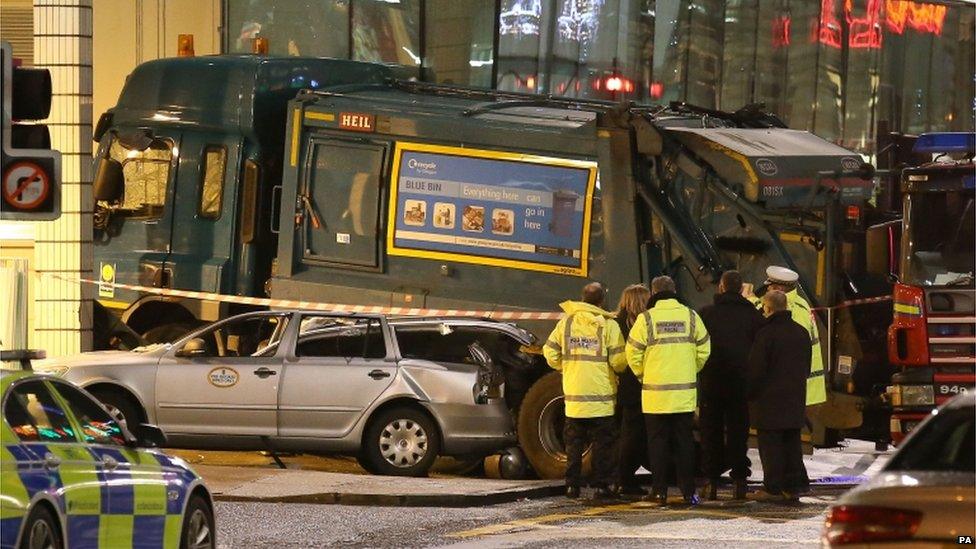
The Glasgow City Council bin lorry crashed killing six people on 22 December 2014
The fatal accident inquiry into the Glasgow bin lorry crash, which killed six and injured 15, has now finished hearing evidence and closing submissions. But what was examined during the inquiry, and what have we learned?

When and where did the crash happen?
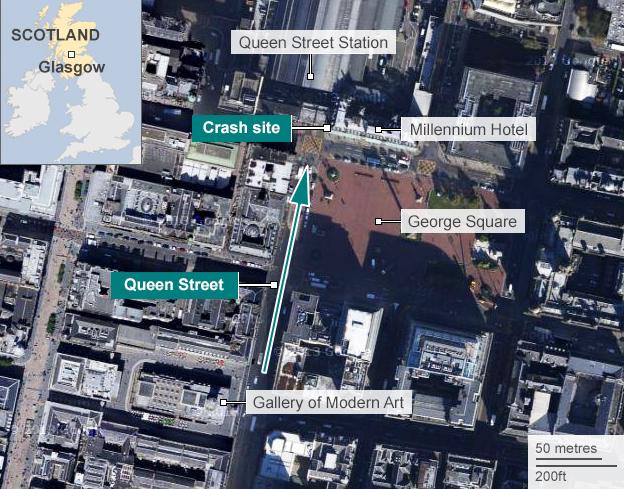
On the afternoon of 22 December 2014, a Glasgow City Council bin lorry was travelling along Queen Street towards its final stop.
Harry Clarke was at the wheel, while crewmen Henry Toal and Matthew Telford chatted about football and Christmas in the back seat, separated from the driver by a metal safety bar.
At 14:29, just after the traffic lights at the Gallery of Modern Art, Mr Clarke suddenly slumped forward at the wheel.
Mr Telford leaned over and hit his colleague on the back as the 26-tonne vehicle ran out of control and mounted the kerb. "You're killing people Harry," he screamed at Mr Clarke.
Just 19 seconds later, the vehicle came to rest against the Millennium Hotel, with six people dead and 15 injured.

Who died?
-
Jacqueline Morton
×The 51-year-old worked in a tax office in the centre of Glasgow.
It is understood Jaqueline Morton had finished work and was on her way to collect her two grandchildren when she was killed in the bin lorry crash.
She left behind her partner John and two grown-up sons.
-
Stephenie Tait
×Twenty-nine-year-old school teacher Stephenie Tait had been enjoying the build-up to Christmas and had attended a carol service at her local church the night before the tragedy.
During her funeral at the beginning of January, the pupils she taught at St Philomena's Primary School in Glasgow said their goodbyes.
Canon Peter McBride, who led the Requiem Mass, told mourners gathered: 'Stephenie brought order, organisation, good humour and a sense of calm into family life, her teaching career, her parish ministry, and into her friendships.'
-
Gillian Ewing
×Events co-ordinator Gillian Ewing had recently moved to Cyprus but was back in Scotland visiting her family and friends for the festive season.
The 52-year-old mother-of-two was doing what thousands were doing in Glasgow that day - shopping for Christmas gifts.
She died alongside five others when a Glasgow City Council bin lorry careered out of control.
Ms Ewing's funeral took place in Edinburgh on hogmanay, 2014.
-
Erin McQuade
×Glasgow University student Erin McQuade had been enjoying the Christmas break when a bin lorry struck and killed her on 22 December 2014.
When not studying for her degree, the 18-year-old worked for Cameron House Hotel Resort, near Loch Lomond.
Professor Anton Muscatelli, principal and vice-chancellor of Glasgow university, said following Miss McQuade's death: 'The university is deeply saddened to hear that one of our students has been tragically killed in this terrible incident.
'Our thoughts and prayers are with Erin McQuade's family at this dreadfully sad time.'
-
Jack Sweeney
×Pensioner Jack Sweeney was Christmas shopping with his wife Lorraine, daughter Jacqueline and grand-daughter Erin when the tragedy happened.
The 68-year-old from Dumbarton was killed along with Lorraine and Erin.
Mr Sweeney had previously lived in Ontario, in the east of Canada.
He was an avid Celtic supporter and was a one-time president of a Celtic supporters' club in Ontario.
Mr Sweeney had been married to Lorraine for more than 45 years.
His joint funeral Mass was attended by more than 1,000 people.
-
Lorraine Sweeney
×It was three days from Christmas, and Lorraine Sweeney was shopping in the centre of Glasgow with her husband, daughter and grand-daughter.
The 69-year-old died alongside Jack, the man she had married more than 45 years earlier.
Mrs Sweeney's 18-year-old grand-daughter Erin was also killed when the Glasgow City Council bin lorry careered out of control.
The tragedy was witnessed by Mrs Sweeney's daughter, Jacqueline, who had been shopping with her family.
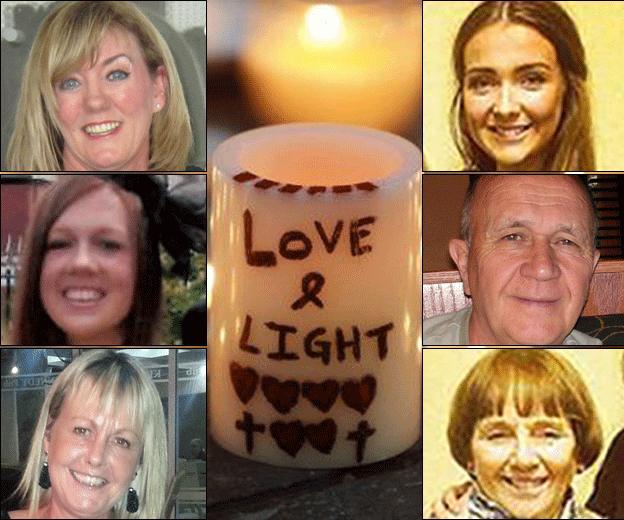
Jacqueline Morton, Stephenie Tait, Gillian Ewing, Erin McQuade, Jack Sweeney and Lorraine Sweeney died in the accident on 22 December 2014

What happened?
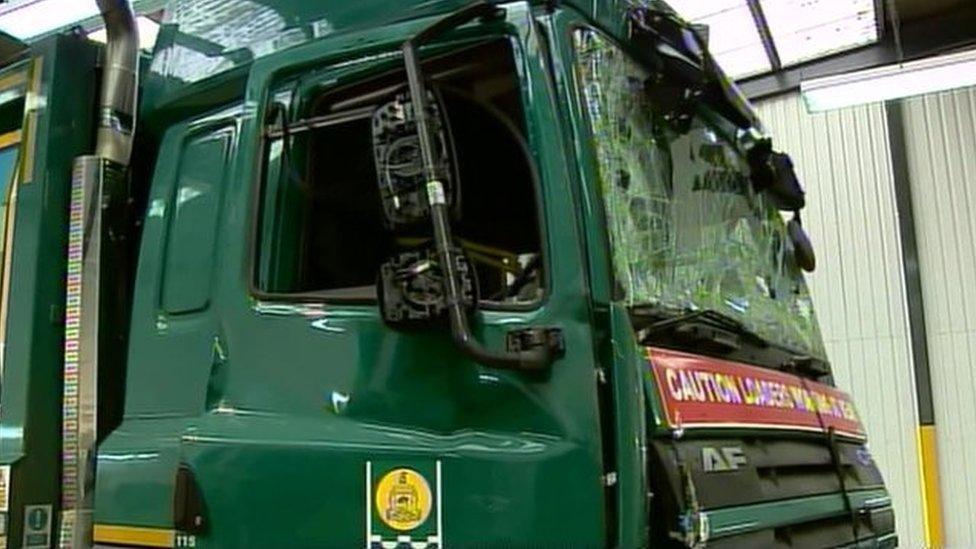
The bin wagon was examined and found to have no mechanical defects
Mr Clarke said he blacked out "like a light switch". He remembered seeing Christmas lights, the bin lorry crashing into the hotel and Mr Telford shouting "wake up".
When paramedics reached him, he couldn't remember what had happened, and asked those who treated him if he had suffered a heart attack.
He was taken to the Western Infirmary Hospital, where he underwent "extensive investigation", including heart and brain scans and a "tilt table test", which confirmed the diagnosis of neurocardiogenic syncope, external.
This is one of a broad and difficult to diagnose range of fainting episodes, specifically caused by a drop in blood pressure. The question of whether Mr Clarke had suffered such episodes before, or was in some way particularly susceptible to them, became a key argument in the inquiry.
Police, the Crown Office and the Health and Safety executive agreed that the matter should be investigated by police as a road traffic collision.
Tests on the lorry found no mechanical faults or any problems which could have contributed to the crash.
Police discovered three unopened bottles of beer in the cab, although it was concluded these had probably been given to the crew as a Christmas gift; Mr Clarke's blood tests came back negative for alcohol and any drugs.

Six things we know about the driver Harry Clarke's health
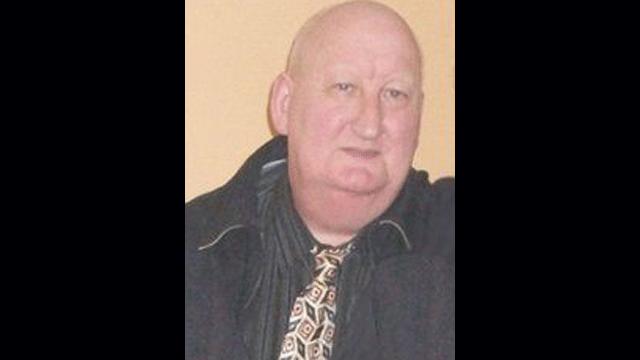
Harry Clarke has had a series of fainting episodes dating back to 1976
Mr Clarke is a 58-year-old Glaswegian who has been employed as a driver for most of his working life.
The inquiry was told he had had a history of dizziness and vertigo dating back to 1976.
In 1989, Mr Clarke's medical records showed he had suffered a fainting episode.
He also experienced an episode of dizziness and tightness in his chest while driving in 1994.
In 2003 Mr Clarke was advised not to drive an oil tanker.
While sitting at the wheel of a number 54 bus belonging to First Bus in April 2010, he had another episode. This particular event was the subject of detailed scrutiny during the inquiry.

How is his medical history relevant?
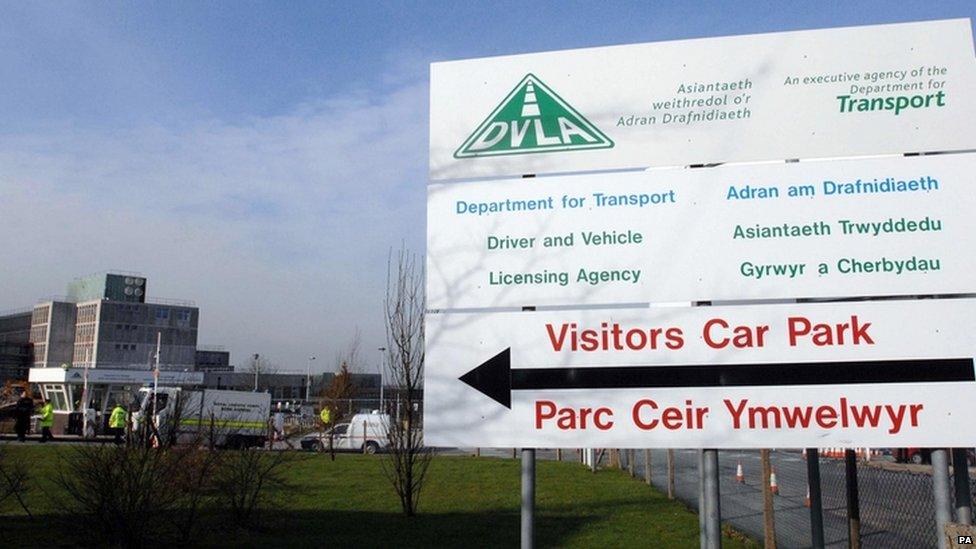
None of Harry Clarke's Driver and Vehicle Licensing Agency declarations or work forms were sent to his GP
Mr Clarke had to fill out a number of health declarations, both for his employers and the DVLA, around the time he was taken on by Glasgow City Council.
The inquiry was shown a succession of forms where Mr Clarke denied having ever suffered from fainting or blackouts, along with vertigo, dizziness and a depression, all of which were also mentioned in his GP records.
Crucially, none of his Driver and Vehicle Licensing Agency declarations or work forms were sent to his GP to be checked over, so his true medical history didn't come to light until the inquiry.
Dr Willox, a Bupa occupational health doctor who conducted one of Mr Clarke's medicals, said she would have stopped him from driving had she known about his previous episode.

How much did the council know when they hired Mr Clarke?
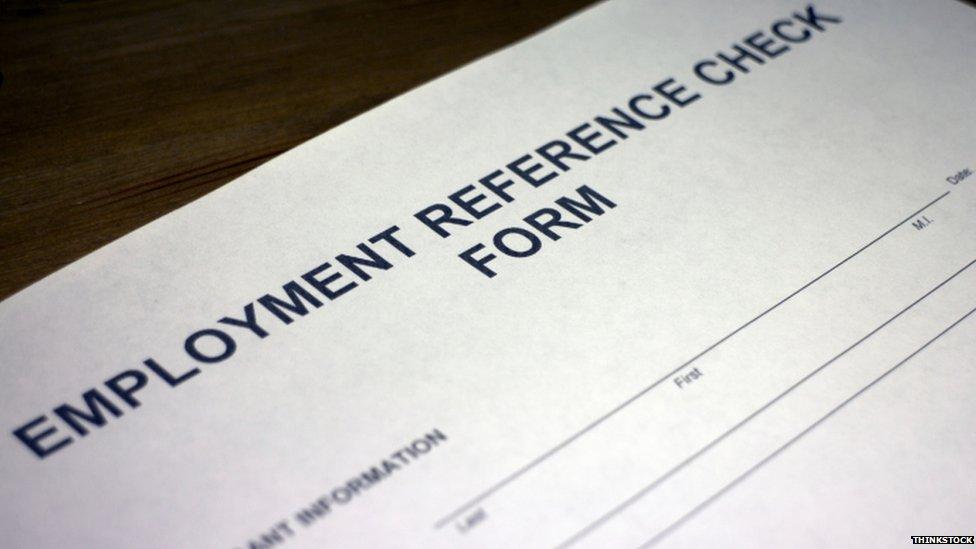
First Bus manager Francis McCann said he couldn't recall filling in a reference
None of the council staff giving evidence knew the extent of Mr Clarke's medical history - in fact department head Douglas Gellan said he had only found out about it during the inquiry.
Mr Clarke's references from his previous employers could not be found on his council file, and a detailed search failed to uncover their whereabouts.
First Bus manager Francis McCann said he couldn't recall filling in a reference, but said he would have mentioned the fact Mr Clarke resigned under suspension and his medical history, including the 2010 episode.
Iain Buick, who interviewed Mr Clarke before he started with the authority as a minibus driver for schoolchildren, said he was sure he had seen the references and was satisfied by them, but had no actual recollection of doing so.

Could anything have been done to prevent the crash?

The inquiry heard an emergency stop button could be added to heavy vehicles such as bin lorries
Technical experts were brought in to examine the cab of the lorry and whether either of the crewmen in the rear could have reached the handbrake lever on the dashboard from behind the metal safety bar.
Vehicle examiner Philip Balderstone said reaching the lever with a seatbelt on, while the vehicle was moving, was "remote".
And another expert said Mr Toal and Mr Telford had as little as five seconds in which to react, and had acted the way most people would have in the "intense environment" of the crash.
The inquiry also heard:
Pulling the brake could have caused the bin lorry to skid down the pavement, potentially causing even more casualties - although North Lanarkshire Council did tests in a similar lorry and found it stopped within five metres.
An emergency stop button or even an automated braking system could be added to such vehicles in future.
Having a driver's GP check over applications for bus and lorry licences and renewals would help make sure unfit drivers could not "slip through the net".

What did Harry Clarke tell the inquiry?
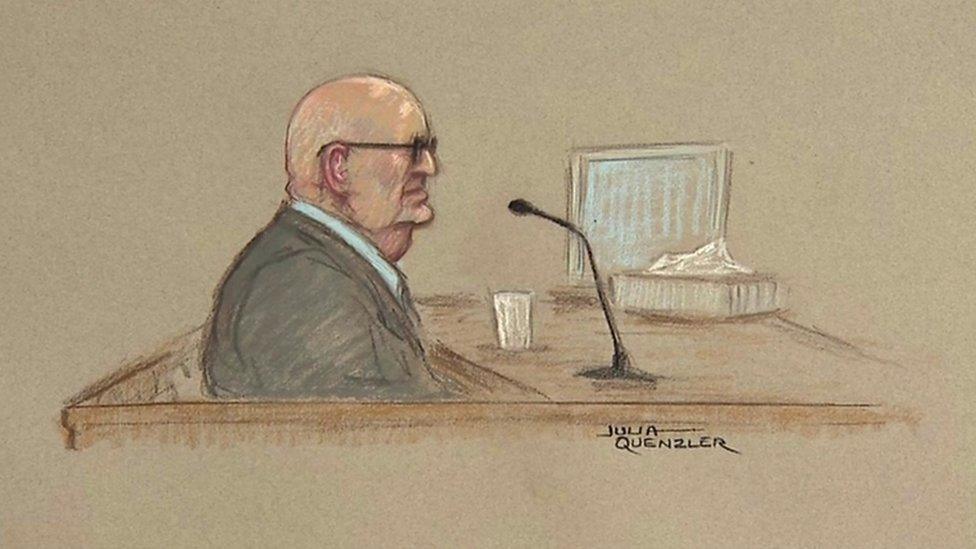
Driver Harry Clarke was seated while being questioned at the inquiry into the bin lorry crash
On day 22 of the fatal accident inquiry into the bin lorry crash, the driver, Harry Clarke, entered the witness box.
But for question after question, he repeatedly used the same response: "I don't want to answer that."
While he did give some answers about his recollections of the day of the crash, the reason for the 58-year-old's lack of candour was based on the risk he might say something that could incriminate him in a future prosecution.
Indeed, the sheriff presiding over the inquiry told Mr Clarke - a number of times - that he did not have to answer any question, other than to confirm his name and age.
Some of the victims' relatives have said they want to bring a private prosecution against Mr Clarke and as the driver began giving his evidence, several family members walked out of court.

What happens now?

The legal process has some way to go before families learn the conclusions of the Fatal Accident Inquiry
While Sheriff Beckett considers the evidence he has heard and prepares a written judgement, some of the families and their legal teams will begin their bid for a private prosecution of Mr Clarke.
As the Solicitor General noted, a private prosecution is a "rare and exceptional beast" - only two have been brought in Scotland in the last 100 years.
The victims' families would need time, possibly a month, to raise funds - there is no legal aid for this course of action - and the inquiry heard that at least two more months would be needed to pursue the matter in the High Court.
If a private prosecution is granted it is unclear how long that might take - and it could delay the publication of the sheriff's determination if there was a risk that it could potentially prejudice any trial.
In his closing remarks, Sheriff Beckett said he would not "rush to judgement" and indicated that he hoped to issue his determination before January.
- Published17 August 2015
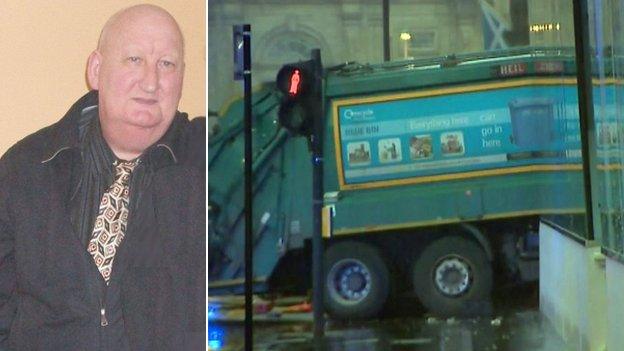
- Published30 July 2015
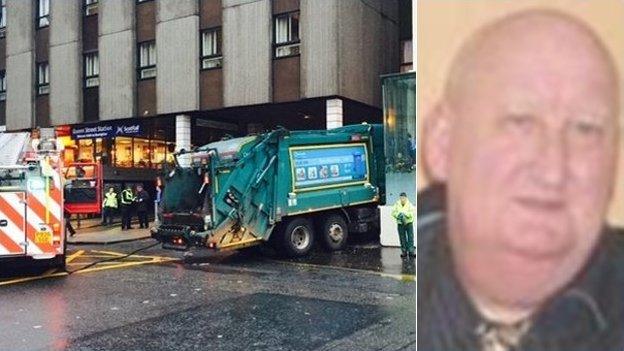
- Published29 July 2015
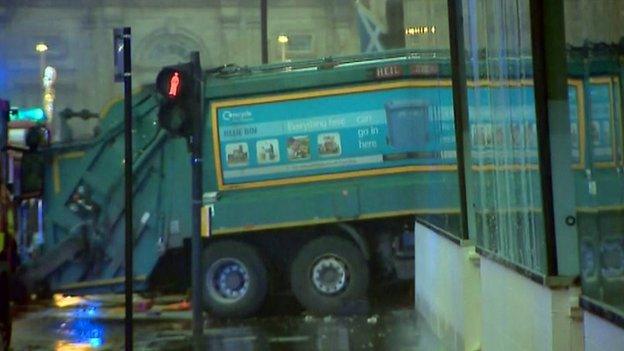
- Published28 July 2015
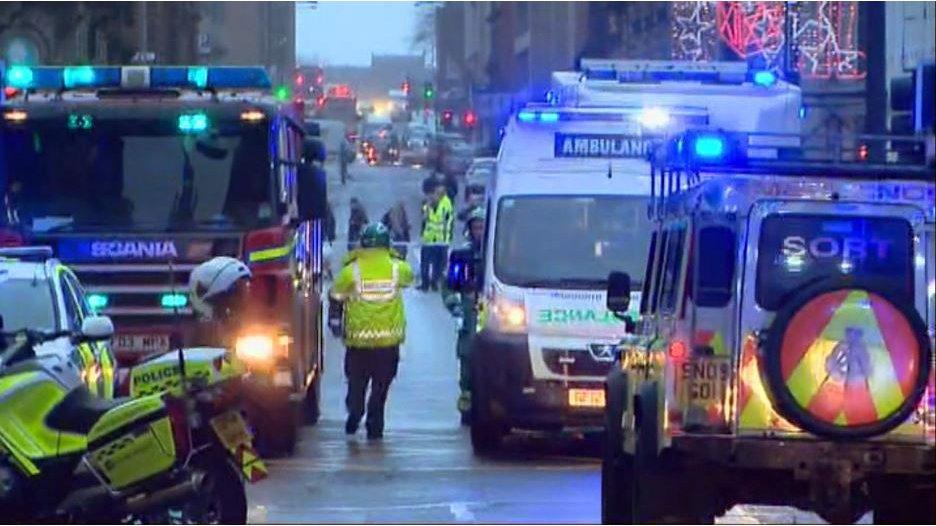
- Published23 July 2015
